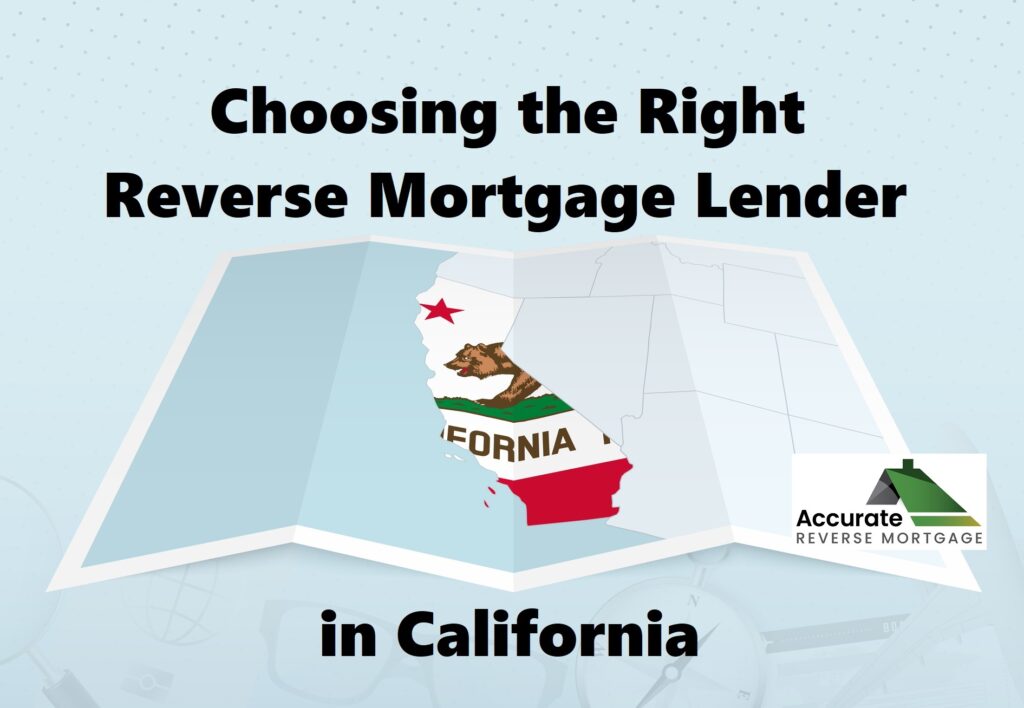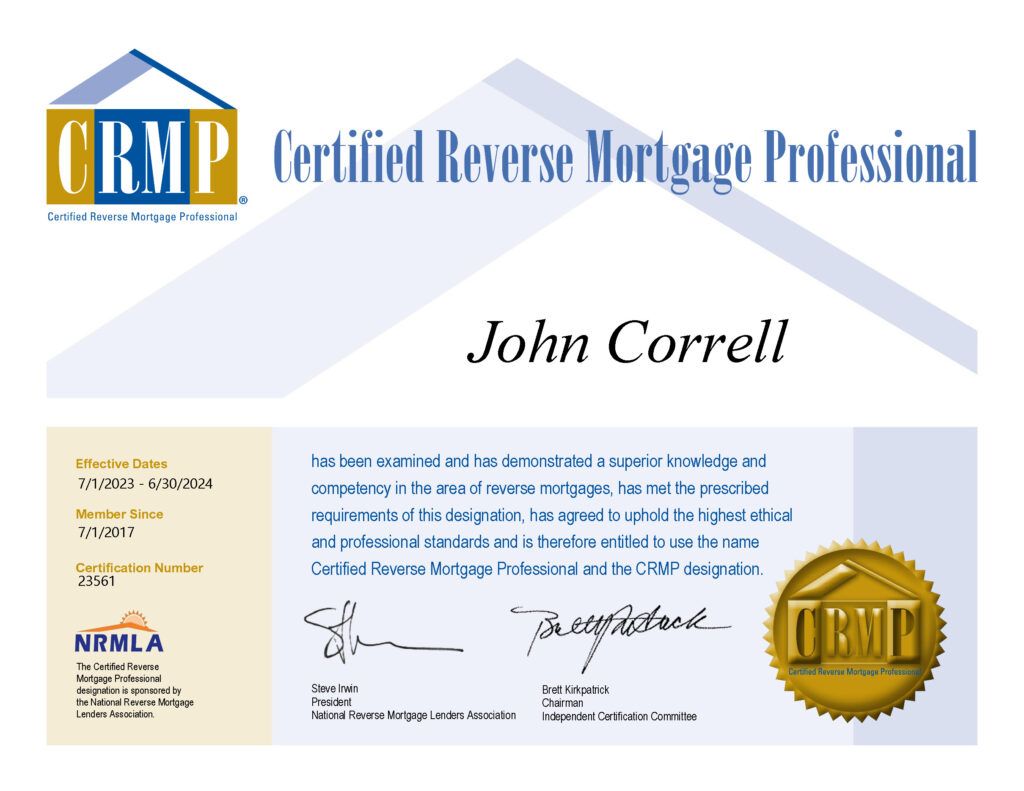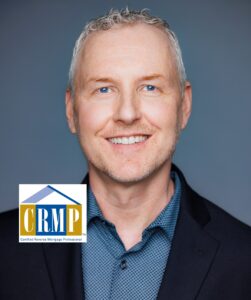Choosing the Right Reverse Mortgage Lender or Broker in California
This article reviews some of the key factors in selecting a reverse mortgage lender or broker in California. This guide simplifies the process, explaining what to consider when choosing a company to work with on a reverse mortgage from the loan officer, lender vs broker and what to look out for and avoid. Written from the prospective of a CRMP which stands for Certified Reverse Mortgage Professional.
presented by John Correll, CRMP

How to Find the Best Reverse Mortgage Lender in California
Introduction Overview:
Explanation of Reverse Mortgages in California
Reverse mortgages are a special type of home loan that cater to older homeowners and can enable many to tap into their home’s equity without selling the property or having the burden of a monthly mortgage payment. Here, for borrowers that qualify, the lender disburses funds to the homeowner as a lump sum, regular monthly payments, or a line of credit, using the home’s equity as security. Repayment typically occurs when the homeowner no longer resides in the home, sells it, or upon their passing or other maturity event. While there is no monthly mortgage payment the borrower does need to keep paying their property taxes, homeowners insurance and any other housing expenses like HOA dues (if any) and home maintenance. At least one borrower does need to continue to live in the home as their primary residence. If those are done there is no monthly mortgage payment during the life of the reverse mortgage. This “no monthly mortgage payment” feature is what makes them unique and so popular.
Importance of Selecting the Right Reverse Mortgage Company in California
Did you know that California is not only the largest state in the country, but by a landslide it is the state with the highest number of reverse mortgages. As you can imagine there are a wide array of reverse mortgage companies and loan officers that offer reverse mortgages. Some loan officers have dedicated themselves to reverse mortgages and some simply do an occasional reverse mortgage amongst a lot of other loan types. So where to start and what should you look for when selecting a loan officer to work with?

Key Factors to Consider When Choosing a Reverse Mortgage Lender in California
Experience and Track Record in Originating Reverse Mortgages
Choosing a loan officer with years of experience in handling reverse mortgages matters. They know the ins and outs of these very specialized loans because they’ve been doing it for a while. Unfortunately, the reverse mortgage industry is plagued with inaccurate information from the media and even loan officers new and lacking experience. Selecting someone very experienced shows they can handle these complex transactions well. Your goal should be to have every question answered which should help give you confidence that they’ll guide you smoothly through the process and solve any issues that might come up. With an experienced loan officer, you have a trustworthy partner for your reverse mortgage journey.
Specialization in Reverse Mortgages
Specialization in reverse mortgages isn’t just about understanding and explaining the financial instrument—it’s about catering to the unique needs and circumstances of older adults, providing them with options and peace of mind with the end goal of obtaining financial security in their retirement years.
List of reasons to choose a true specialist in reverse mortgages
- Specialized Expertise in Unique Retirement Challenges: Specialists in reverse mortgages bring a focused understanding of this specific financial product, ensuring they’re well-versed in its complexities and nuances. Reverse Mortgages are quite different from a traditional mortgage so not all loan officers have the deep knowledge necessary to truly navigate them.
- Comprehensive Knowledge of Reverse Mortgage Ins and Outs: These specialists possess detailed knowledge about eligibility criteria, payment structures, risks, and benefits associated with reverse mortgages.
- Stay Updated Current Regulations on Reverse Mortgage Trends: Continuously staying abreast of evolving regulations and market changes, they provide the most current and relevant information.
- Customized Solutions: Unlike general loan officers, reverse mortgage specialists tailor have a deep understanding of the working of reverse mortgages which can allow them to assist in recommendations and multiple choices to align with seniors’ broader financial plans, ensuring a better fit.
- Avoid Pitfalls and Mistakes: A quality specialist’s focus enables them to identify and minimize potential risks, prioritizing the well-being of seniors in the process.

Reputation and Testimonials From Past Reverse Mortgage Clients
One of the best ways to get an insight into the experience and character of the loan officer is through a review of their online reviews and testimonials of other clients they have assisted. The opinions and experiences shared by past clients are super important when picking a specialist for a reverse mortgage. These testimonials show how good the specialist is at their job and how much their clients trust and appreciate them. When you see lots of positive reviews, it means the specialist likely knows their stuff, communicates well, and really cares about their clients’ needs. These testimonials help new clients find someone they can trust and feel confident about when dealing with such an important financial decision.
Reliable Sites to Review Online Reverse Mortgage Testimonials
- Google Business
- Yelp
- BBB (Better Business Bureau)
Reverse Mortgage Closing Costs and Fees and Loan Terms
When you’re checking out closing costs for reverse mortgages from different companies and loan officers, it’s important to focus on the fees they include and the interest rates charged. These fees cover things like origination, appraisal, title insurance, and counseling. Differences in these costs can impact how affordable the loan becomes and how much funds can be available with a reverse mortgage. Some lenders might have lower initial fees but compensate with higher ongoing charges or interest rates. By comparing these costs from various lenders, you can find the best fit for your financial goals and situation. It’s about finding the balance between upfront expenses and long-term affordability.
Tips on Reverse Mortgage Closing Costs and Fees
- Breakdown of Fees: Look at what each lender charges for things like origination, appraisal, title insurance, and counseling.
- Upfront vs. Long-Term Costs: Check if one lender has lower initial fees but higher ongoing charges or interest rates.
- Interest Rates & Margin on Adjustable Rate Reverse Mortgages: Compare how much interest each lender is charging and margin on the adjustable rate products. The margin on the loan will impact how much funds are available to the borrower.
- Help with Closing Costs via Lender or Broker Credit: See if any lender offers discounts or assistance with closing costs. Ask if there is a lender or broker credit available as this can vary from lender to lender and save you money.
Comparing Reverse Mortgage Lenders vs Brokers in California
Understanding the difference between reverse mortgage lenders and brokers is important. Lenders give loans directly, while brokers link borrowers to many lenders. Lenders have their own loan options, while brokers give access to more choices from different lenders. Working with a lender can often seem easier, but you might have fewer options or have to work out of a large call center. Brokers offer more variety of products and lenders they partner with and can have some distinct advantages. Deciding involves thinking about convenience, options, fees, and how much help you want.
List of potential advantages of working with a reverse mortgage broker compared to directly with a lender
- More Options: Reverse Mortgage Brokers provide access to multiple lenders, offering a wider range of loans to fit the borrowers needs.
- Comparison Help: Brokers can check and provide a side-by-side comparison of different types of reverse mortgages to find the best one for you, which might have better terms.
- Saves Time: Brokers handle the paperwork and conversations, saving you time.
- Avoid Disadvantages of Large Lender Call Centers: Many large lenders operate out of a large mega call centers which doesn’t profile the one-on-one dynamic that many brokers offer.
- Possibly Lower Costs: Brokers could get you better rates or deals, saving you money.
- Help with Tricky Situations: A highly rated reverse mortgage broker can find options for complex cases, like if you have credit issues or unique circumstances.
- Ability to Move Application to New Lender: If the lender does not approve the loan or has issues with the file including unique circumstances or property types, the broker has the ability to move the application to a new lender while a direct lender has only their products.
- Easier Process: Brokers simplify things by dealing with many lenders for you.

Red Flags to Watch Out For With a Reverse Mortgage Lender
The process in researching and securing a reverse mortgage for yourself can be a big process and even stressful. While there are a lot of quality people in the reverse mortgage industry there are some red flags to watch out for. If any of these red flags come up for you then maybe its best to take a time out or get a second opinion from another loan officer. You are under no obligation to close on a reverse mortgage even if you applied for one or signed an application with another company. The borrower can even move their application to a new reverse mortgage company.
Red Flags Include:
- Pressure to Decide Quickly: Being rushed or pressured into making a decision hastily is a huge red flag. Take your time when getting a reverse mortgage.
- Unclear Fees or Costs: Lack of transparency about fees or unclear explanations of total loan expenses.
- Misleading Information: Providing incomplete or misleading details about loan terms, risks, or obligations.
- Unable or Slow to Answer Your Questions: If every time you ask a question about something on the reverse mortgage the loan officer can’t answer the question or needs to ask and get back to you that can be a sign they are not skilled at reverse mortgages and you might wish to consult another loan officer or company and move your application.
- Communication Issues: The loan officer and reverse mortgage company work for you. If you are not getting a timely response to your calls or emails that is a red flag and sign you may wish to find another lender.
- Avoiding Alternative Options: Reluctance to discuss or pressure to accept a specific loan type without exploring other choices especially if you ask them and they don’t.
- Unsolicited Offers: Receiving unwanted offers or pressure through unsolicited calls urging you to consider a reverse mortgage.
- Unexpected Changes in Terms: Sudden or unexplained alterations in loan terms without reasonable explanation. You are under no obligation to close the reverse mortgage even if you sign an application.
- Lack of Certification: Failure to show proper licensing or certification as required by regulators is a big red flag.
Can I transfer my reverse mortgage application to another lender or broker?
YES! Absolutely. HUD allows a case transfer of your HECM reverse mortgage application to another lender or broker if you feel your needs are not being served or you wish to move your loan application for any reason.
Finding the Best Reverse Mortgage Company in California
Keep in mind, the “Best” reverse mortgage company depends on your unique circumstances and preferences. Take the time to conduct comprehensive research and consultations to discover the optimal choice that aligns with your specific financial situation. Speaking to more than one loan officer will allow you to make sure you are getting your needs served and finding someone you feel comfortable working with.

Seek a Lender or Broker with a CRMP – Certified Reverse Mortgage Professional on Staff
If someone is looking to ensure they are getting the most current and reliable information on reverse mortgages, they may wish to consult a CRMP which stands for Certified Reverse Mortgage Professional.
The CRMP designation is a mark of excellence within the field of reverse mortgages, denoting exceptional expertise, ethical conduct, and dedication. The designation is from NRMLA which is the National Reverse Mortgage Lenders Association which is the voice for the industry To earn this certification, individuals undergo rigorous training, gain substantial experience, and pass a comprehensive exam covering diverse aspects of reverse mortgages. This designation showcases a commitment to high standards and a deep understanding of the complexities inherent in reverse mortgage lending. Clients can trust CRMP-certified professionals for their expertise, commitment, and adherence to the industry’s top standards.
Ready to get started? Request a Quote Online
Give us a call at (888) 603-1550
John Correll, CRMP
Certified Reverse Mortgage in California
Key Highlights of Reverse Mortgages and How they Work in California
- Age Requirement: Accessible to homeowners aged 62 or above. (55 on certain types of proprietary reverse mortgages.
- Home Equity Access: Enables homeowners to convert home equity into cash.
- Payment Flexibility: Typically no monthly mortgage payments, which can improve cashflow by lowering monthly expenses. (NOTE: borrower will still need to pay their own property taxes, homeowners insurance and other housing expenses like maintenance or hoa dues if any.)
- Repayment Scenario: Repayment occurs upon a maturity event which could include: sale of the home, permanent relocation, or the homeowner’s passing or failure to pay taxes/insurance etc.
- Funding Options: Qualified borrowers can receive funds in lump sums, regular payments, a line of credit, or a blend of these choices.
- Interest and Costs: Accrual of interest on the loan amount with potential fees like closing costs and mortgage insurance premiums.
- Ongoing Ownership Duties: Homeowners maintain title to their home and are still responsible for taxes, insurance, and home upkeep as a loan requirement.
- Impact on Inheritance: Heirs can settle the loan by selling the home or repaying the debt. Any remaining equity, post-loan repayment, belongs to the heirs or estate.
- Government Protection: Some reverse mortgages are federally insured by the FHA, offering borrower protections.

I hope you have found value in the above materials. Deciding on who to work with on your reverse mortgage is a big decision. I would be honored to earn your business and deliver exceptional service from day one on the initial conversation thru closing and years beyond. I invite you to give me a call.
-John Correll, CRMP
California Certified Reverse Mortgage Professional John Correll CRMP
(619) 294-9820 | (888) 603-1550
Accurate Reverse Mortgage Corp.
4025 Camino Del Rio S., Suite 339
San Diego, CA 92108
Licensing Info:
NMLS # 2484031, 1004396 CA Bur Real Estate Broker # 02214678, 01353015
Allow Accurate Reverse Mortgage Corp to Be Your Reverse Mortgage Company of Choice
Serving the Reverse Mortgage Needs of the Entire State of California




